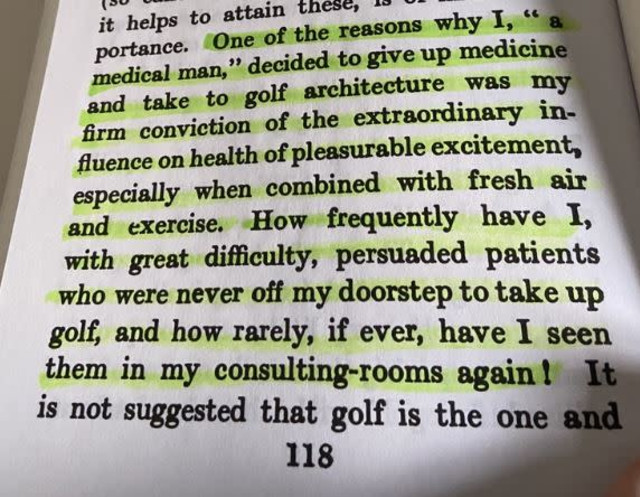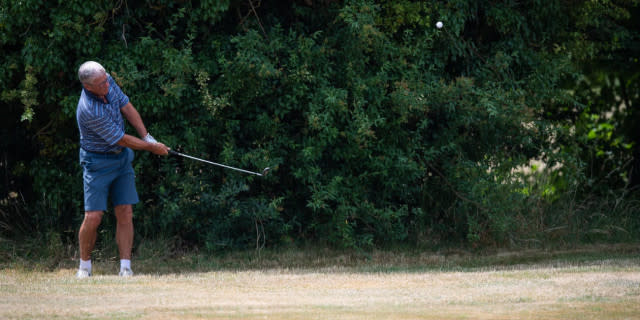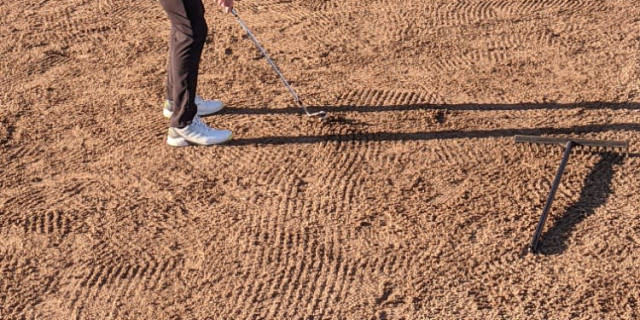
The Case For Golf on Social Prescribing Day
Thursday 9th March 2023 is Social Prescribing Day.
Recent headlines have been made by the provision of golf through prescription in the Fife area of Scotland.
Instead of tablets and medicines, patients are being encouraged to get into golf as a means of getting extra exercise but also finding the social benefits that golf as a whole provides.
This should be no surprise at all as golf has scientifically verified health and well-being benefits across a range of areas.
Today is #SocialPrescribingDay and we're shining the spotlight on 'Golf for Health', a pioneering health initiative which ‘prescribes’ golf for individuals to encourage a more active lifestyle.
— Scottish Golf (@ScottishGolf) March 9, 2023
Learn more about the initiative ??????????https://t.co/ksFq9PplUD pic.twitter.com/BuRpBTtVZ3
Few sports offer the inter-generational ability to play competitively using the handicap system. Grandfathers competing with and against granddaughters.
How many sports offer this?
There are no barriers in our sport through gender, race or religion, or even physical ability or disability. I have played golf on equal terms with, and been beaten by severely disabled golfers like my hero Kris Aves.
Blind golf is an incredible sport and having been exposed to the work of On Course Foundation in the rehabilitation of service personnel it is simply awe inspiring to see how the game can become the thread upon which the hard yards of rehabilitation operate.
What is Social Prescribing?
Taken from The Wildlife Trust magazine, this is a perfect description:
“Preventable illnesses are sometimes caused by loneliness and social isolation, or physical inactivity. This can lead to anxiety, stress, lung conditions and other health problems.
"Activities that bring people together and increase their level of physical activity can help to improve people’s health. These activities provide practical support and training and can bring happiness and meaning into people's lives.
"This is social prescribing.
"An effective healthcare system rooted in the community, the people that live there and the organisations that work with them.”
Golf is all the above but we also factor in the incredible physics and science of knocking a little ball around a field to cause it to drop into a small hole.

The History
Golf has been linked to health-related activities throughout the generations especially when ‘taking the waters' or hydropathic remedies became very popular.
This coincided with the increase in reach and accessibility via the railway systems and many spa resorts created golf courses in order to add further attractions for the travelling tourist.
The benefits of golf to sooth the hearts and minds of "troubled souls" was also well recognised.
Many hospitals, especially those described at the time as mental institutions and asylums, were designed to have a golf course attached them for the therapeutic value that such an activity provided.
In the Commissioners in Lunacy Scotland Report of 1878, the use of golf was emphasised as a treatment option hoping that an outdoor activity would act as “a deterrent for morbid thoughts, distracting and engaging the patients through the entertainment.”
One of the first such venues was the Gartnavel Hospital in Glasgow (at the time known as the Glasgow Royal Lunatic Asylum). This golf course restricted access to doctors, staff and patients and was created in 1893.
17 other similar facilities quickly followed suit in Scotland due to the benefits being found by both staff and patients.
Golf's Original Influencers
Several golf course architects in the early 20th century sought to encourage a healthier lifestyle through golf.
After World War 1, there were so many people affected by mustard gas and lung disease that there was a massive upturn in the popularity of golf as it was considered a desirable form of "pleasurable exercise." This indirectly led to the introduction of a handicap system as it was necessary to limit the number of people playing as the activity was so popular. A golden age of golf course creation followed this concept.
In 1927, J.H. Taylor, the five-time Open Champion, and F.G. Hawtree established The National Association of Public & Proprietary Golf Clubs. Both men realised that ‘public’ golf would grow from strength to strength and that the Association could bring about agreement between ‘private’ and ‘public’ golf.
As early as 1920, Dr Alister MacKenzie was talking about his efforts to socially prescribe golf in his book on Golf Course Architecture.

This is when many municipal golf facilities were created to meet the need. The birth of public golf was encouraged as many believed that having them publicly accessible encouraged a more active lifestyle.
He actually left the medical profession to concentrate on his golf course architecture business that led to some of the world’s greatest layouts and venues, including Augusta National in 1932.
He also created Cavendish Golf Club in Buxton, Derbyshire, which is in my humble view one of the best courses under 6,000 yards in the world.
Golf is Good
It is inter-generational, non-gender specific and provides so many social benefits. We should be actively trying to get involved and support the social prescribing movement.
Golf in Society as a group are worthy of a standalone article given the proven benefits they establish using golf as the thread upon which all other service provision is based.
They support those suffering with dementia, but also provide skilled respite care for the carers. They provide rehabilitation support for those waiting for major surgery. The better prepared you are from a fitness standpoint the shorter the recovery time and release from hospital.
This isn’t just a “nice thing” - it actually pays for itself, for every pound invested there is a return on investment of over £17. I think this is a great idea that can actually take some of the pressure from the NHS and its magnificent hardworking staff.
Imagine a time when golf clubs and courses become hubs for social prescribing around the UK.
Social prescribing and golf should be seen as partners going forward. Early versions of it were certainly created using golf as the sporting platform - and that could also represent the future.
About the author

Andrew Picken is a Golfshake ambassador and prolific golf traveller who writes course reviews, travel features, and destination guides. A passionate golfer for over two decades, he plays regularly across the UK and Europe and is involved in several golf societies and charity events. Andrew is committed to promoting the game and showcasing the variety of golfing experiences available to enthusiasts of all abilities.









